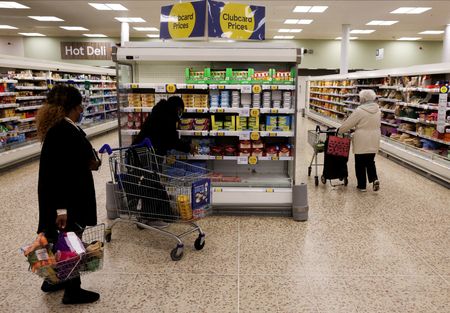By William Schomberg and William James
LONDON (Reuters) – British consumers unexpectedly increased their shopping in January, but the big picture remains one of weak demand from inflation-hit households relying more on discounts at retailers to make ends meet.
Official data published on Friday showed sales volumes rose by 0.5% from December for only the second month-on-month increase since August 2021. A Reuters poll of economists had pointed to a 0.3% fall in sales last month.
Fuel sales rose in January, reflecting a fall in prices, and discounting helped online retailers as well as jewellers, cosmetic stores and carpet and furnishing shops, the Office for National Statistics said.
But clothing store sales fell back sharply after rising for four months, and food store sales dropped again as consumers hunted for cheaper products and bought fewer items.
Sales volumes in the key Christmas month of December fell more deeply than previously reported, dropping by 1.2% from November, rather than the original estimate of a 1.0% decline.
“After December’s steep fall, retail sales picked up slightly in January, although the general trend remains one of decline,” ONS Director of Economic Statistics Darren Morgan said in a statement.
Sales fell by 5.1% compared with January 2022 for their 10th consecutive year-on-year drop, the longest such run since the 2008-09 global financial crisis.
Volumes were 1.4% below their levels immediately before the coronavirus pandemic struck.
Britain’s economy is widely expected to fall into a recession this year under the weight of the leap in inflation and polling firm GfK’s consumer confidence index last month showed households close to their gloomiest since at least 1974.
Sterling fell slightly against the dollar and the euro immediately after the data was published.
The Bank of England has said the surge in inflation seems to be turning a corner and data published on Wednesday showed the consumer prices index fell by more than expected, although at 10.1% it is more than five times the BoE’s target.
It is also much higher than growth in wages, eating into the spending power of consumers.
Energy bills for households could fall by the summer which, while still sky-high compared with their levels before Russia’s invasion of Ukraine, could alleviate the drag on demand.
But James Smith, an economist with ING, said the prospect of house price falls and higher mortgage costs risked adding to the gloom among consumers.
“Overall, we’re expecting a very mild recession through the first half of this year,” he said.
Finance minister Jeremy Hunt has ruled out another major round of support for households when he delivers an annual budget statement on March 15, and there is also likely to be more pain for borrowers from the BoE soon.
The central bank is expected by most analysts and investors to raise interest rates again, this time by a quarter of a percentage point in March. It might do the same again in May, which would take Bank Rate to 4.5%, the highest since 2008.
With consumers feeling the pinch, retailers are battling to win over price-conscious shoppers.
Recent industry data has shown particularly strong performances from German-owned discounters Aldi and Lidl as shoppers seek to offset grocery inflation, which hit a record 16.7% in the four weeks to Jan. 22.
The British arm of Aldi said this week it would hire more than 6,000 workers.
(Writing by William Schomberg; Graphic by Sumanta Sen; Editing by William James and Alex Richardson)


